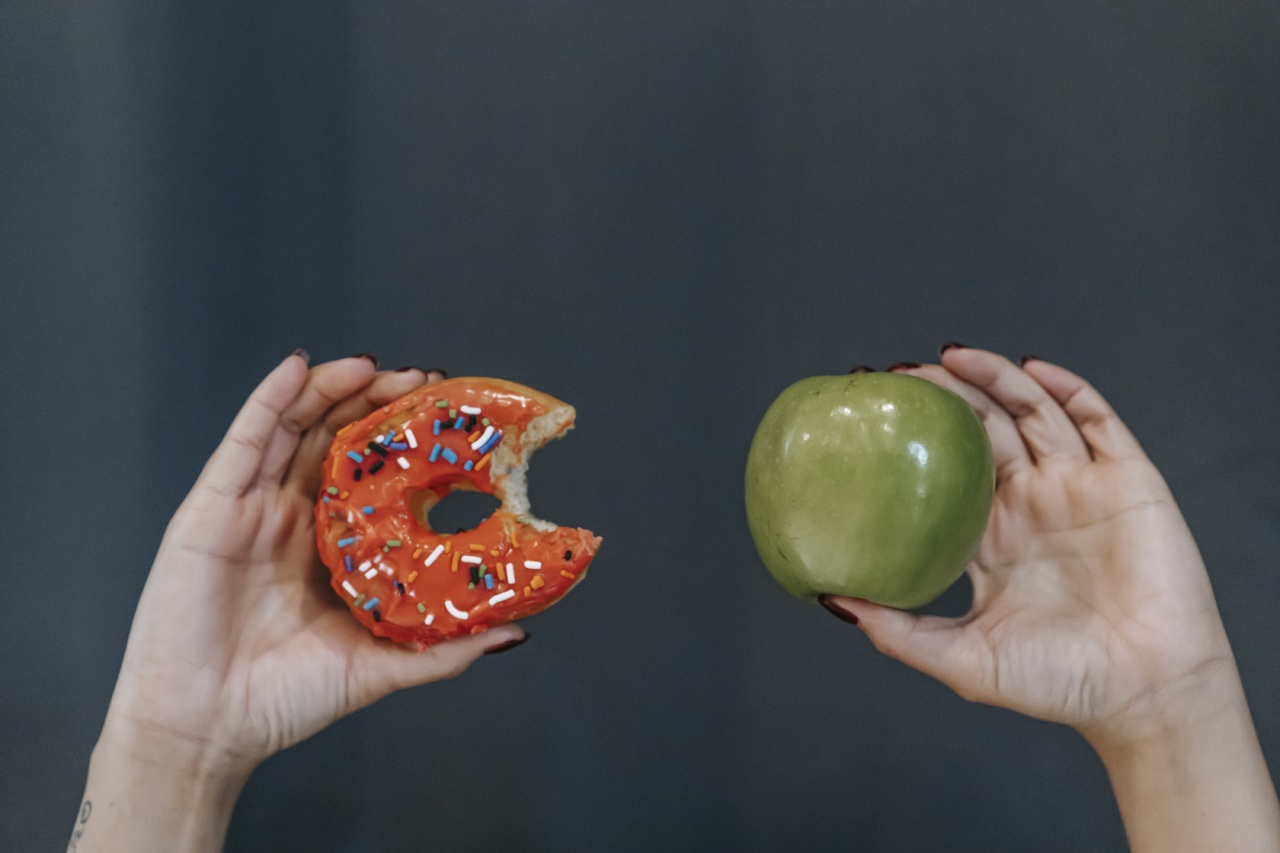Many of us have a sweet tooth and enjoy indulging in sugary treats from time to time. However, excessive sugar consumption can have detrimental effects on our health.
When we eat too much sugar, our bodies send out various visual signals that indicate an unhealthy sugar intake. This article explores 30 visual signals that your body may exhibit when you consume an excess of sugar.
1. Weight Gain
One of the most common visual signals of excessive sugar consumption is weight gain. Consuming too much sugar leads to an increase in calorie intake, which can result in an expansion of your waistline.
2. Acne Breakouts
High sugar intake can trigger acne breakouts. When you consume a lot of sugar, it causes your blood sugar levels to spike, leading to inflammation and increased sebum production, both of which can contribute to acne formation.
3. Constant Fatigue
After consuming excess sugar, you may experience a sudden energy crash. This is known as a sugar crash, which can leave you feeling fatigued and drained, hampering your productivity and overall well-being.
4. Frequent Hunger Cravings
Eating too much sugar can disrupt your appetite regulation mechanisms, leading to increased hunger cravings. You may find yourself constantly wanting to snack or feeling unsatisfied even after a large meal.
5. Mental Fog and Poor Concentration
Excessive sugar consumption can impair brain function and lead to mental fog and poor concentration. High sugar intake can disrupt neurotransmitter levels and cause cognitive decline.
6. Mood Swings and Irritability
When you eat too much sugar, your blood sugar levels spike and then crash rapidly, resulting in mood swings and irritability. These fluctuations in blood sugar levels can greatly impact your emotional well-being.
7. Dental Problems
Sugar is known to be a major contributor to dental issues such as cavities, tooth decay, and gum disease. Excess sugar consumption provides fuel for harmful bacteria in the mouth, leading to oral health complications.
8. Skin Aging
High sugar intake accelerates skin aging by a process called glycation.
Sugar molecules attach themselves to proteins in the body, including collagen and elastin, causing them to lose their strength and flexibility, resulting in wrinkles and saggy skin.
9. Increased Risk of Type 2 Diabetes
Consuming excessive amounts of sugar can contribute to insulin resistance, a condition in which your body becomes less responsive to insulin. Over time, this can lead to an increased risk of developing type 2 diabetes.
10. Poor Dental Appearance
Excessive sugar consumption not only harms your teeth but can also impact your dental appearance. Regular consumption of sugary beverages or foods can stain your teeth, leading to a less attractive smile.
11. Poor Gut Health
Sugar feeds harmful bacteria in the gut and disrupts the balance of good and bad bacteria. This can lead to digestive issues such as bloating, gas, and an increased risk of developing conditions like leaky gut syndrome.
12. Increased Risk of Heart Disease
High sugar intake is associated with an increased risk of heart disease. It can lead to elevated triglyceride levels, increased blood pressure, and inflammation, all of which are risk factors for cardiovascular problems.
13. Frequent Headaches
Sugar can trigger headaches, especially in those who are prone to migraines. The consumption of sugar causes blood sugar fluctuations and can lead to dehydration, both of which are known triggers for headaches.
14. Joint Pain and Inflammation
Excessive sugar intake can contribute to chronic inflammation in the body, which may result in joint pain and discomfort. It can exacerbate conditions such as arthritis and increase the risk of developing other inflammatory diseases.
15. Reduced Immune Function
Consuming too much sugar can weaken the immune system, making you more susceptible to infections, viruses, and other illnesses. It impairs the functioning of white blood cells, which play a crucial role in fighting off pathogens.
16. Increased Risk of Cancer
High sugar intake has been linked to an increased risk of certain types of cancer, including breast, colon, and pancreatic cancer. Cancer cells tend to thrive on sugar, and excess sugar consumption can fuel their growth.
17. Rapid Aging
Sugar affects the collagen and elastin fibers in the skin, leading to premature aging. This visual signal can manifest as fine lines, wrinkles, and sagging skin, making you appear older than you actually are.
18. Fatty Liver Disease
Excessive sugar consumption is a significant contributor to non-alcoholic fatty liver disease. High sugar intake leads to an accumulation of fat in the liver, which can cause inflammation, scarring, and liver damage over time.
19. Difficulty Losing Weight
Consuming too much sugar can hinder your weight loss efforts. Sugar is high in calories and provides little to no nutritional value, making it easy to exceed your daily caloric needs and prevent weight loss.
20. Insulin Resistance
Regularly consuming excessive amounts of sugar can lead to insulin resistance, a condition in which your cells become resistant to the hormone insulin.
This impairs the body’s ability to regulate blood sugar levels and can contribute to the development of type 2 diabetes.
21. Increased Risk of Alzheimer’s Disease
Research suggests that there is a link between excessive sugar consumption and an increased risk of developing Alzheimer’s disease. High sugar intake can impair brain function and contribute to cognitive decline over time.
22. Sugar Cravings and Addiction
Consuming a large amount of sugar can lead to sugar cravings and addiction. Sugar stimulates the reward centers in the brain, leading to a desire for more sugar and potentially leading to a cycle of cravings and overconsumption.
23. Weakened Vision
Excess sugar in the blood can accumulate and damage the small blood vessels in the eyes, leading to weakened vision or even vision loss. High sugar intake is a risk factor for diabetic retinopathy, a condition that affects the retina.
24. Hyperpigmentation
Hyperpigmentation, or darkening of certain areas of the skin, can be a visual signal of excessive sugar consumption. Sugar can lead to imbalances in hormone levels, which can stimulate melanin production and result in dark spots or patches.
25. Increased Risk of Depression
Consuming too much sugar has been linked to an increased risk of depression. High sugar intake can lead to inflammation and imbalances in neurotransmitter levels, both of which can contribute to the development of depressive symptoms.
26. Increased Severity of Allergies
Excessive sugar consumption can worsen allergies and allergic reactions. High sugar intake can trigger inflammation in the body, making allergic symptoms more severe and harder to manage.
27. Brittle Nails
Unhealthy sugar consumption can lead to brittle, weak nails. Sugar disrupts normal protein formation in the body, affecting the strength and structure of nails and making them more prone to breakage and damage.
28. Hormonal Imbalances
High sugar intake can disrupt hormone balance in the body. It can lead to imbalances in insulin, cortisol, and other hormones, contributing to issues such as irregular menstrual cycles, PMS symptoms, and hormonal acne.
29. Increased Risk of Kidney Disease
Excessive sugar consumption is associated with an increased risk of kidney disease. High sugar intake contributes to the development of obesity, high blood pressure, and diabetes, all of which are risk factors for kidney problems.
30. Signs of Withdrawal
When you significantly reduce or eliminate sugar from your diet, you may experience withdrawal symptoms. These can include cravings, mood swings, and feelings of irritability similar to those experienced during the withdrawal from addictive substances.
Conclusion
Excessive sugar consumption can have a significant impact on your overall health and well-being.
By being aware of the visual signals that your body sends when you eat too much sugar, you can take steps to reduce your sugar intake and improve your overall health. Moderation and mindful eating are key to maintaining a healthy balance and minimizing the negative effects of sugar on your body.




























